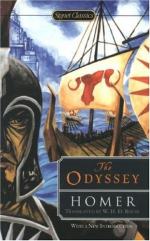“Yet one night more, my friends, indulge your
guest;
The last I purpose in your walls to rest:
To-morrow for myself I must provide,
And only ask your counsel, and a guide;
Patient to roam the street, by hunger led,
And bless the friendly hand that gives me bread.
There in Ulysses’ roof I may relate
Ulysses’ wanderings to his royal mate;
Or, mingling with the suitors’ haughty train,
Not undeserving some support obtain.
Hermes to me his various gifts imparts.
Patron of industry and manual arts:
Few can with me in dexterous works contend,
The pyre to build, the stubborn oak to rend;
To turn the tasteful viand o’er the flame;
Or foam the goblet with a purple stream.
Such are the tasks of men of mean estate,
Whom fortune dooms to serve the rich and great.”
“Alas! (Eumaeus with a sigh rejoin’d).
How sprung a thought so monstrous in thy mind?
If on that godless race thou would’st attend,
Fate owes thee sure a miserable end!
Their wrongs and blasphemies ascend the sky,
And pull descending vengeance from on high.
Not such, my friend, the servants of their feast:
A blooming train in rich embroidery dress’d,
With earth’s whole tribute the bright table
bends,
And smiling round celestial youth attends.
Stay, then: no eye askance beholds thee here;
Sweet is thy converse to each social ear;
Well pleased, and pleasing, in our cottage rest,
Till good Telemachus accepts his guest
With genial gifts, and change of fair attires,
And safe conveys thee where thy soul desires.”
To him the man of woes; “O gracious Jove!
Reward this stranger’s hospitable love!
Who knows the son of sorrow to relieve,
Cheers the sad heart, nor lets affliction grieve.
Of all the ills unhappy mortals know,
A life of wanderings is the greatest woe;
On all their weary ways wait care and pain,
And pine and penury, a meagre train.
To such a man since harbour you afford,
Relate the farther fortunes of your lord;
What cares his mother’s tender breast engage,
And sire forsaken on the verge of age;
Beneath the sun prolong they yet their breath,
Or range the house of darkness and of death?”
To whom the swain: “Attend what you enquire;
Laertes lives, the miserable sire,
Lives, but implores of every power to lay
The burden down, and wishes for the day.
Torn from his offspring in the eve of life,
Torn from the embraces of his tender wife,
Sole, and all comfortless, he wastes away
Old age, untimely posting ere his day.
She too, sad mother! for Ulysses lost
Pined out her bloom, and vanish’d to a ghost;
(So dire a fate, ye righteous gods! avert
From every friendly, every feeling heart!)
While yet she was, though clouded o’er with
grief.
Her pleasing converse minister’d relief:
With Climene, her youngest daughter, bred,




